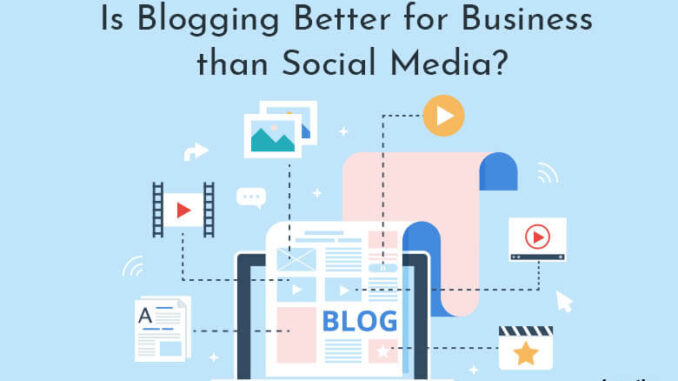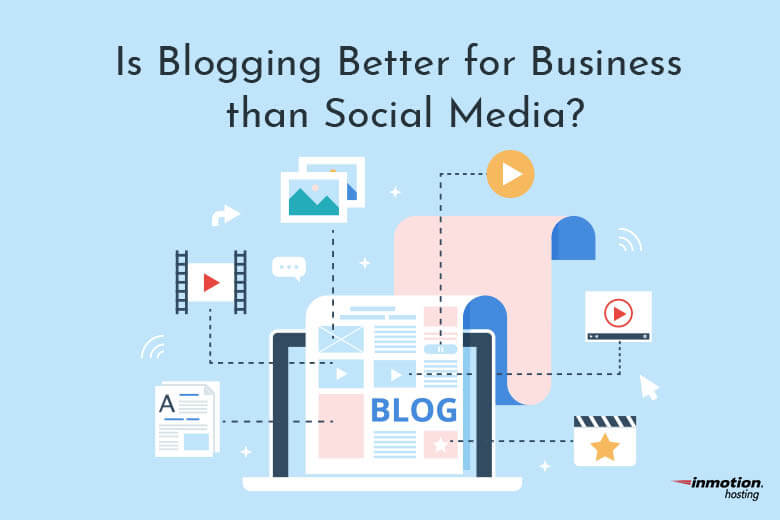

If you’ve followed my blog for a while, you’ve probably seen me write a few posts on topics similar to this one. For example, “Blogging vs PPC: Which is a Better Value for your Business?” Any time you read a post like that, I have one particular answer, which you’ve probably come to expect: use both. These are frequently comparisons between various components of a comprehensive marketing strategy; my goal is to convince you that employing both is preferable to focusing solely on one. This article is going to be no different, but I will say one thing upfront: some businesses will benefit more from one strategy than the other, and I’m going to give you a bit of a nuanced answer, more so than I usually do in these kinds of posts.
So, you have two strategies in front of you. Blogging and social media are both parts of a good marketing plan, but which one will work best for your business? The answer for this depends on what kind of business you have.
30 Second Summary
You’ll find both blogging and social media useful, but each works better for different businesses. You can use blogging if you sell digital products, run a niche business or want full control over your sales process. You’ll get better results from social media if you sell visually appealing products, target specific age groups or run a local business. For the best results, you should use both since they work together – your blog gives you content to share while social media brings traffic to your posts.
Blogging for Business
I’m a huge proponent of blogging, but I can admit that there are some cases where blogging isn’t the best strategy to employ. You have to put a lot of time, effort, and energy into blogging to be successful, and it can take years to pay off. In order to speed up the process of building a base faster than with organic “build it and see” strategies, it is frequently complemented by other strategies, such as PPC advertising. businesses that sell digital goods or services or digital services. Blogging is great as a foundation to draw in users and sell them on your products or services. You can link them to landing pages, product pages, service pages, pricing pages; all manner of additional pages that help convince them that they’re likely to get a positive return on investment if they pick up whatever it is that you’re putting down.
The primary benefit here is that you can have your product or service pages on the same website and domain. With social media, you have to pry people away from social media to get them to your website to buy something. Some people do that just fine and flitter back and forth between social media and links at the drop of a hat. Others like to stay where they are, and clicking a link to leave a site can be a tall order.
Niche businesses. The more niche your business is, chances are the more effort it will take to convince someone that they want what you sell. A major product category like, say, shoes, has a ton of competition. You’re never going to out-rank Nike or Reebok or Adidas, they’re simply too gigantic. Blogging is especially difficult when you’re trying to establish a new competitor amongst an industry that is filled with giants and household names.
Niche businesses with small competitors can find it much easier to rank with a blog. Plus, even though it takes more work to convince people they’re interested in your products, you have the luxury of being able to do that. There will not be a character limit on your posts like there is on social media. Attention spans are short, but not quite as short as you get on social networks. Plus, you can use all of the same graphical and multimedia techniques you might otherwise want to with social media on a blog.
Stores that are open and available 24/7. Social media thrives during business hours and with immediate, “I’m out shopping right now and want to find a product” kinds of purchase intent. Blogging, conversely, works best for anything that can accept and process orders any time of day, not just during business hours.
Ideally, this means you either have an order fulfillment process or a new account creation and setup process that is completely automatic. This is pretty easy to do with modern tools, so there’s no reason you would need to manually oversee new customers.
Conversely, if your product or service requires direct onboarding and a human connection, you might not do as well with blogging. Don’t get me wrong, blogging is still great, but you do lose out on the ability to onboard a new customer at 2 am because they’re signing up during a reasonable time in their time zone, but long after you went to bed in yours.
Businesses that want deep control over every aspect of their conversion process. Conversion rate optimization is a massive topic that I haven’t fully covered myself, largely because there are a ton of great guides already written about the subject. However, control is the lone determining factor. You’ll do better in the long run if you have greater control over specific aspects of your sales funnel and conversion process. Social media has a big issue with this. You will frequently encounter restrictions on a platform like Facebook or Twitter. Images must be uploaded in a particular format and in particular sizes. You have a limited number of characters for your posts before they’re truncated behind a Read More link. The algorithm determines how much exposure you should receive from your audience. You can’t tweak things like the color of your buttons or the site design. You’re dramatically limited in a wide array of customizations that you can access on your website.
Now, don’t get me wrong, social media has a lot of options for improving your conversion rate. Specifically, they have a ton of options for improving your conversion rate within their framework. You can’t change anything outside of their framework, though.
Social Media for Business
I’m not quite as big a fan of social media as some other people, and even as I used to be a few years ago. I used to be heavy into social media usage, but the truth is, it has declined in several ways over the last half a decade or so. Reach is constantly declining, you’re more than ever forced to pay for advertising just to reach your existing audience, and there is a constant string of controversies happening on those platforms. Unfortunately, it’s only going to get tougher and more competitive with every passing year.
Social media is still very good for a few types of businesses, though.
